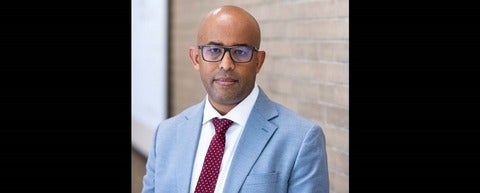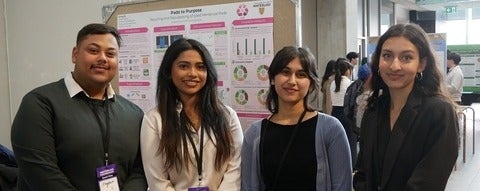Welcome to Chemical Engineering at the University of Waterloo
As part of Canada's largest engineering school and most innovative university, the Department of Chemical Engineering at the University of Waterloo is home to approximately 1,000 students, faculty and staff, and has thousands of alumni worldwide.
Our Department consistently ranks among the top two universities in Canada and the number one university in Ontario in Chemical Engineering according to the Shanghai Academic Ranking of World Universities.
In addition to offering undergraduate and graduate programs in chemical engineering, the Department provides academic expertise and support to Waterloo's collaborative nanotechnology and biomedical engineering programs.
The department's collaborative research culture, engaging teaching practices and state-of-the-art facilities create a vibrant learning environment where students are empowered to solve the problems our world faces.
Capstone Design Projects
Participation in Capstone Design Projects synthesizes theory learned in class, lab work, and real-world experience from co-op programs. Students are able to create design projects in areas that interest them. Capstone Design projects often lead to the creation of a marketable product and entrepreneurial opportunities for the graduating students.
Chemical Engineering MASc student takes first place in the 2023 GRADflix Showcase
Competition at the 2023 GRADFlix Showcase was stiff with 25 finalists vying for a big win. Chemical Engineering MASc student Andrew Stella won first place and the People’s Choice award yesterday in the 2022 GRADflix competition. Congratulations Andrew! Check out his winning video below.
Chemical Engineering Lab Tour
Join us for a tour of the Chemical Engineering undergraduate labs in the Douglas Wright Engineering Building at the University of Waterloo.
Find out more by exploring the programs, research and news stories on this site.
News
Tizazu Mekonnen wins the prestigious Macromolecular Science and Engineering Division Early Career Award
Professor Tizazu Mekonnen has been awarded the Macromolecular Science and Engineering Division (MSED) Early Career Instigator Award. The award is sponsored by NOVA Chemicals.
This honour is bestowed upon researchers who have made substantial contributions to the polymer industry, aligning perfectly with Mekonnen's disruptive research in polymer engineering and sustainability.
Mekonnen spearheads a dynamic research program focusing on material sustainability. His initiatives range from developing polymers sourced sustainably to creating compostable plastics, crafting eco-friendly nanomaterials, and exploring low-carbon alternatives.
Transformative Journey: How a Chemical Engineering degree empowered this alumnus to reinvent himself
Kartik Subramanian (Class of '98) chose to study Chemical Engineering at the University of Waterloo because he wanted to study a discipline of engineering that related to food, energy, advanced materials, and medicine.
Subramanian was eager to understand everyday needs from a scientific perspective. For Subramanian, the department’s small class sizes, the engagement level of the professors and the caliber of his peers made his time here memorable.
Leading Innovation: Trailblazing Capstone Design Projects
Excitement was in the air at the 2024 Capstone Design Symposium as Chemical Engineering students showcased their Fourth-Year Capstone Design Projects! Students applied their knowledge, skills, and creativity toward solving real-world problems.
Beyond the classroom, Capstone Design Projects have the potential to make a real difference in the world. Some projects were developed in collaboration with industry partners or community organizations. This allowed students to address real-life challenges and potentially contribute to positive change. This year’s winning teams are excellent examples of such projects. Many were aimed at advancing UN Sustainable Development Goals.
Events
Distinguished Speaker Seminar| Metal Derivative Chemical Looping Systems: A Gateway to Novel Energy and Fuel Conversion Technology , by Professor Liang-Shih Fan
The Chemical Engineering Department is hosting a Distinguished Speaker Seminar Series on Metal Derivative Chemical Looping Systems: A Gateway to Novel Energy and Fuel Conversion Technology.














